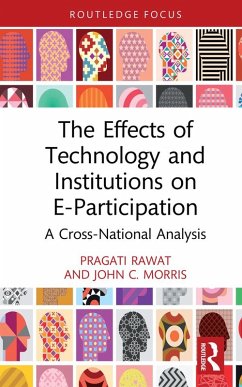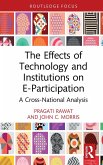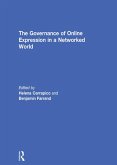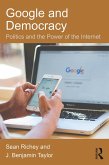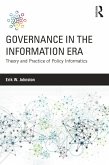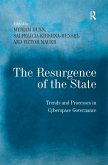In this book Pragati Rawat and John C. Morris identify and evaluate the impact of factors that can help explain the difference in e-participation, public participation using information and communication technology, in different countries.
While cross-sectional studies have been covered, few have taken an in-depth look at cross-national studies. This book attempts to fill the gap using quantitative panel data to explore the influence of technology and institutions, and the impact of their complex relationships in a mediation and moderation analysis, on e-participation. The current study reviews the scholarly work in the field of "offline" and "online participation" to identify a set of antecedents that influence e-participation. A conceptual framework is developed, supported by the theories from the public policy and socio-technical premise. The authors utilize secondary data, primarily from the UN and World Economic Forum, for 143 countries from three waves of surveys to measure the dependent and explanatory variables. The panel data is statistically analyzed and findings reveal the role of technology as a mediator as well as a moderator for institutions' impact on e-participation.
The Effects of Technology and Institutions on E-Participation provides a groundbreaking country-level analysis that will appeal to academics and students of e-government and Digital Government, Public Policy, Public Administration, Public Sector Innovation, and Public Participation.
While cross-sectional studies have been covered, few have taken an in-depth look at cross-national studies. This book attempts to fill the gap using quantitative panel data to explore the influence of technology and institutions, and the impact of their complex relationships in a mediation and moderation analysis, on e-participation. The current study reviews the scholarly work in the field of "offline" and "online participation" to identify a set of antecedents that influence e-participation. A conceptual framework is developed, supported by the theories from the public policy and socio-technical premise. The authors utilize secondary data, primarily from the UN and World Economic Forum, for 143 countries from three waves of surveys to measure the dependent and explanatory variables. The panel data is statistically analyzed and findings reveal the role of technology as a mediator as well as a moderator for institutions' impact on e-participation.
The Effects of Technology and Institutions on E-Participation provides a groundbreaking country-level analysis that will appeal to academics and students of e-government and Digital Government, Public Policy, Public Administration, Public Sector Innovation, and Public Participation.
Dieser Download kann aus rechtlichen Gründen nur mit Rechnungsadresse in A, B, BG, CY, CZ, D, DK, EW, E, FIN, F, GR, HR, H, IRL, I, LT, L, LR, M, NL, PL, P, R, S, SLO, SK ausgeliefert werden.

